UCSF to Share Startup Knowledge at 2017 Global Entrepreneurship Summit
Entrepreneurship Center Director Among 150 Invited Speakers for Annual Event

Stephanie Marrus, MA, MBA, director of UC San Francisco’s Entrepreneurship Center, is among 150 invited speakers at the 2017 Global Entrepreneurship Summit.
The annual event, held this year in Hyderabad, India, from Nov. 28 to 30, is a program of the White House and U.S. State Department that aims to showcase entrepreneurs and investors from around the world and to connect American and international partners.
This year’s summit, in partnership with the Republic of India, will highlight the theme “Women First, Prosperity for All,” and it will focus on supporting women entrepreneurs and fostering economic growth globally. Some 1,500 attendees will participate in training and mentoring sessions, networking, and investment matchmaking. Several entrepreneurs affiliated with the UCSF Entrepreneurship Center have been invited to attend.
“I’m proud to be representing UCSF and the U.S. and to be able to bring our knowledge base to entrepreneurs from other geographies,” said Marrus.
Marrus will lead a Master Class on pitching to investors. Successful entrepreneurs know how to tell their stories effectively to potential investors or partners, said Marrus, and pitching is a key skill to master.
“Investor funding criteria are specific and distinct from the expectations of technically focused inventors,” she said. “Entrepreneurs believe their science or technology is paramount while investors are focused on the market opportunity and having a team that can execute on an idea.”
Aspiring entrepreneurs in the life sciences and medical fields face the special challenge of working with the U.S. Food and Drug Administration, which regulates the market approval process. Funding requirements for life science and health care inventions are high because of the need for clinical trials to validate safety and efficacy.
Marrus teaches many of these skills in the Startup 101 class offered through the Entrepreneurship Center. The center supports scientists and clinicians who want to commercialize their inventions through a startup, offering classes, mentorship, and exposure to investors and high-profile CEOs from Silicon Valley. Several startups shepherded by the center have been accepted into top-tier startup accelerators like Y Combinator, Stanford’s StartX and UC Berkeley’s SkyDeck.
“If you want to have impact beyond UCSF and massively scale with the goal of improving human health, we offer a pathway: create a company to commercialize your invention,” said Marrus. “Entrepreneurs are a special personality type. We offer a vehicle to explore whether this path is a good fit and your idea has market potential.”